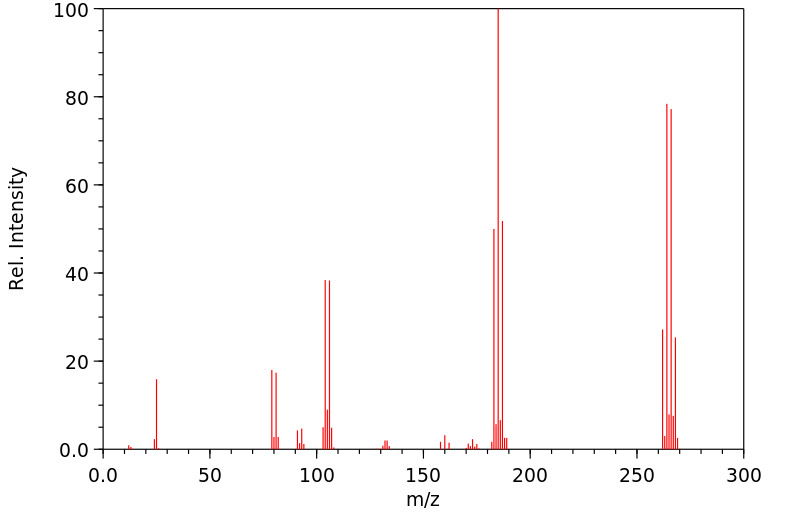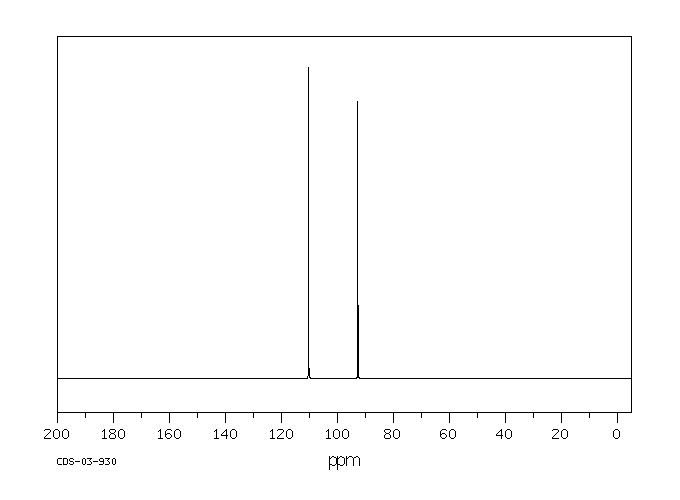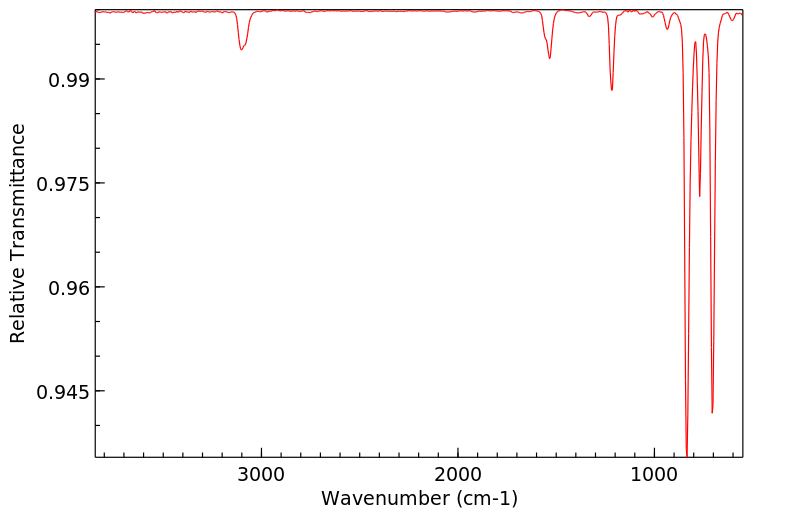三溴乙烯 | 598-16-3
中文名称
三溴乙烯
中文别名
——
英文名称
1,1,2-tribromoethylene
英文别名
tribromoethylene;Tribrom-aethylen;tribromoethene;α,α,β-Tribrom-aethylen;Tribromethylen;1,1,2-tribromoethene
CAS
598-16-3
化学式
C2HBr3
mdl
——
分子量
264.742
InChiKey
OZVJKTHTULCNHB-UHFFFAOYSA-N
BEILSTEIN
——
EINECS
——
-
物化性质
-
计算性质
-
ADMET
-
安全信息
-
SDS
-
制备方法与用途
-
上下游信息
-
文献信息
-
表征谱图
-
同类化合物
-
相关功能分类
-
相关结构分类
物化性质
-
熔点:216-218 °C
-
沸点:163°C
-
密度:2,71 g/cm3
-
保留指数:978;978;961
-
稳定性/保质期:
计算性质
-
辛醇/水分配系数(LogP):3.2
-
重原子数:5
-
可旋转键数:0
-
环数:0.0
-
sp3杂化的碳原子比例:0.0
-
拓扑面积:0
-
氢给体数:0
-
氢受体数:0
安全信息
-
危险品标志:F
-
安全说明:S22,S36/37/39
-
危险类别码:R20/21/22,R36/37/38
-
RTECS号:KX4300000
-
包装等级:III
-
危险类别:6.1(b)
-
危险品运输编号:2810
-
储存条件:储存注意事项: - 储存在阴凉、通风的库房中。 - 远离火源和热源。 - 包装需密封,避免与空气接触。 - 与氧化剂、活性金属粉末及食用化学品分开存放,切忌混储。 - 不宜大量或长时间储存。 - 配备相应类型的消防器材。 - 储存区应配备泄漏应急处理设备和合适的收容材料。
SDS
三溴乙烯 修改号码:4
模块 1. 化学品
产品名称: Tribromoethylene
修改号码: 4
模块 2. 危险性概述
GHS分类
物理性危害 未分类
健康危害
急性毒性(经口) 第4级
急性毒性(吸入) 第4级
皮肤腐蚀/刺激 第2级
严重损伤/刺激眼睛 2A类
环境危害 未分类
GHS标签元素
图标或危害标志
信号词 警告
危险描述 吸入或吞咽有害。
造成皮肤刺激
造成严重眼刺激
防范说明
[预防] 避免吸入。
只能在室外或通风良好的环境下使用。
使用本产品时切勿吃东西,喝水或吸烟。
处理后要彻底清洗双手。
穿戴防护手套/护目镜/防护面具。
三溴乙烯 修改号码:4
模块 2. 危险性概述
[急救措施] 吸入:将受害者移到新鲜空气处,在呼吸舒适的地方保持休息。若感不适,呼叫解毒
中心/医生。
食入:若感不适,呼叫解毒中心/医生。漱口。
眼睛接触:用水小心清洗几分钟。如果方便,易操作,摘除隐形眼镜。继续冲洗。
眼睛接触:求医/就诊
皮肤接触:用大量肥皂和水轻轻洗。
若皮肤刺激:求医/就诊。
脱掉被污染的衣物,清洗后方可重新使用。
[废弃处置] 根据当地政府规定把物品/容器交与工业废弃处理机构。
模块 3. 成分/组成信息
单一物质/混和物 单一物质
化学名(中文名): 三溴乙烯
百分比: >97.0%(GC)
CAS编码: 598-16-3
分子式: C2HBr3
模块 4. 急救措施
吸入: 将受害者移到新鲜空气处,保持呼吸通畅,休息。若感不适立即呼叫解毒中心/医生。
皮肤接触: 立即去除/脱掉所有被污染的衣物。用大量肥皂和水轻轻洗。
若皮肤刺激或发生皮疹:求医/就诊。
眼睛接触: 用水小心清洗几分钟。如果方便,易操作,摘除隐形眼镜。继续清洗。
如果眼睛刺激:求医/就诊。
食入: 若感不适,呼叫解毒中心/医生。漱口。
紧急救助者的防护: 救援者需要穿戴个人防护用品,比如橡胶手套和气密性护目镜。
模块 5. 消防措施
合适的灭火剂: 干粉,泡沫,雾状水,二氧化碳
特殊危险性: 小心,燃烧或高温下可能分解产生毒烟。
特定方法: 从上风处灭火,根据周围环境选择合适的灭火方法。
非相关人员应该撤离至安全地方。
周围一旦着火:如果安全,移去可移动容器。
消防员的特殊防护用具: 灭火时,一定要穿戴个人防护用品。
模块 6. 泄漏应急处理
个人防护措施,防护用具, 使用个人防护用品。远离溢出物/泄露处并处在上风处。确保足够通风。
紧急措施: 泄露区应该用安全带等圈起来,控制非相关人员进入。
环保措施: 防止进入下水道。
控制和清洗的方法和材料: 用合适的吸收剂(如:旧布,干砂,土,锯屑)吸收泄漏物。一旦大量泄漏,筑堤控
制。附着物或收集物应该立即根据合适的法律法规废弃处置。
模块 7. 操作处置与储存
处理
技术措施: 在通风良好处进行处理。穿戴合适的防护用具。防止烟雾产生。处理后彻底清洗双手
和脸。
注意事项: 如果蒸气或浮质产生,使用通风、局部排气。
操作处置注意事项: 避免接触皮肤、眼睛和衣物。
贮存
储存条件: 保持容器密闭。存放于凉爽、阴暗处。
三溴乙烯 修改号码:4
模块 7. 操作处置与储存
存放于惰性气体环境中。
远离不相容的材料比如氧化剂存放。
光敏, 气敏
包装材料: 依据法律。
模块 8. 接触控制和个体防护
工程控制: 尽可能安装封闭体系或局部排风系统,操作人员切勿直接接触。同时安装淋浴器和洗
眼器。
个人防护用品
呼吸系统防护: 防毒面具。依据当地和政府法规。
手部防护: 防护手套。
眼睛防护: 安全防护镜。如果情况需要,佩戴面具。
皮肤和身体防护: 防护服。如果情况需要,穿戴防护靴。
模块 9. 理化特性
液体
外形(20°C):
外观: 透明
颜色: 无色-浅黄色
气味: 无资料
pH: 无数据资料
熔点: 无资料
沸点/沸程 163 °C
闪点: 无资料
爆炸特性
爆炸下限: 无资料
爆炸上限: 无资料
密度: 2.71
溶解度: 溶于: 乙醇 醚 丙酮 氯仿
微溶于: 水
模块 10. 稳定性和反应性
化学稳定性: 一般情况下稳定。
危险反应的可能性: 未报道特殊反应性。
须避免接触的物质 氧化剂, 强碱
危险的分解产物: 一氧化碳, 二氧化碳, 溴化氢
模块 11. 毒理学信息
急性毒性: ihl-mus LC50:3900 mg/m3/2H
orl-mus LD50:1100 mg/kg
对皮肤腐蚀或刺激: 无资料
对眼睛严重损害或刺激: 无资料
生殖细胞变异原性: 无资料
致癌性:
IARC = 无资料
NTP = 无资料
生殖毒性: 无资料
RTECS 号码: KX4300000
模块 12. 生态学信息
生态毒性:
三溴乙烯 修改号码:4
模块 12. 生态学信息
鱼类: 无资料
甲壳类: 无资料
藻类: 无资料
残留性 / 降解性: 无资料
潜在生物累积 (BCF): 无资料
土壤中移动性
log水分配系数: 无资料
土壤吸收系数 (Koc): 无资料
亨利定律 无资料
constaNT(PaM3/mol):
模块 13. 废弃处置
如果可能,回收处理。请咨询当地管理部门。废弃处置时遵守国家、地区和当地的所有法规。
模块 14. 运输信息
联合国分类: 与联合国分类标准不一致
UN编号: 未列明
模块 15. 法规信息
《危险化学品安全管理条例》(2002年1月26日国务院发布,2011年2月16日修订): 针对危险化学品的安全使用、
生产、储存、运输、装卸等方面均作了相应的规定。
《危险化学品名录(2002版)》CN编号:61581
模块16 - 其他信息
N/A
模块 1. 化学品
产品名称: Tribromoethylene
修改号码: 4
模块 2. 危险性概述
GHS分类
物理性危害 未分类
健康危害
急性毒性(经口) 第4级
急性毒性(吸入) 第4级
皮肤腐蚀/刺激 第2级
严重损伤/刺激眼睛 2A类
环境危害 未分类
GHS标签元素
图标或危害标志
信号词 警告
危险描述 吸入或吞咽有害。
造成皮肤刺激
造成严重眼刺激
防范说明
[预防] 避免吸入。
只能在室外或通风良好的环境下使用。
使用本产品时切勿吃东西,喝水或吸烟。
处理后要彻底清洗双手。
穿戴防护手套/护目镜/防护面具。
三溴乙烯 修改号码:4
模块 2. 危险性概述
[急救措施] 吸入:将受害者移到新鲜空气处,在呼吸舒适的地方保持休息。若感不适,呼叫解毒
中心/医生。
食入:若感不适,呼叫解毒中心/医生。漱口。
眼睛接触:用水小心清洗几分钟。如果方便,易操作,摘除隐形眼镜。继续冲洗。
眼睛接触:求医/就诊
皮肤接触:用大量肥皂和水轻轻洗。
若皮肤刺激:求医/就诊。
脱掉被污染的衣物,清洗后方可重新使用。
[废弃处置] 根据当地政府规定把物品/容器交与工业废弃处理机构。
模块 3. 成分/组成信息
单一物质/混和物 单一物质
化学名(中文名): 三溴乙烯
百分比: >97.0%(GC)
CAS编码: 598-16-3
分子式: C2HBr3
模块 4. 急救措施
吸入: 将受害者移到新鲜空气处,保持呼吸通畅,休息。若感不适立即呼叫解毒中心/医生。
皮肤接触: 立即去除/脱掉所有被污染的衣物。用大量肥皂和水轻轻洗。
若皮肤刺激或发生皮疹:求医/就诊。
眼睛接触: 用水小心清洗几分钟。如果方便,易操作,摘除隐形眼镜。继续清洗。
如果眼睛刺激:求医/就诊。
食入: 若感不适,呼叫解毒中心/医生。漱口。
紧急救助者的防护: 救援者需要穿戴个人防护用品,比如橡胶手套和气密性护目镜。
模块 5. 消防措施
合适的灭火剂: 干粉,泡沫,雾状水,二氧化碳
特殊危险性: 小心,燃烧或高温下可能分解产生毒烟。
特定方法: 从上风处灭火,根据周围环境选择合适的灭火方法。
非相关人员应该撤离至安全地方。
周围一旦着火:如果安全,移去可移动容器。
消防员的特殊防护用具: 灭火时,一定要穿戴个人防护用品。
模块 6. 泄漏应急处理
个人防护措施,防护用具, 使用个人防护用品。远离溢出物/泄露处并处在上风处。确保足够通风。
紧急措施: 泄露区应该用安全带等圈起来,控制非相关人员进入。
环保措施: 防止进入下水道。
控制和清洗的方法和材料: 用合适的吸收剂(如:旧布,干砂,土,锯屑)吸收泄漏物。一旦大量泄漏,筑堤控
制。附着物或收集物应该立即根据合适的法律法规废弃处置。
模块 7. 操作处置与储存
处理
技术措施: 在通风良好处进行处理。穿戴合适的防护用具。防止烟雾产生。处理后彻底清洗双手
和脸。
注意事项: 如果蒸气或浮质产生,使用通风、局部排气。
操作处置注意事项: 避免接触皮肤、眼睛和衣物。
贮存
储存条件: 保持容器密闭。存放于凉爽、阴暗处。
三溴乙烯 修改号码:4
模块 7. 操作处置与储存
存放于惰性气体环境中。
远离不相容的材料比如氧化剂存放。
光敏, 气敏
包装材料: 依据法律。
模块 8. 接触控制和个体防护
工程控制: 尽可能安装封闭体系或局部排风系统,操作人员切勿直接接触。同时安装淋浴器和洗
眼器。
个人防护用品
呼吸系统防护: 防毒面具。依据当地和政府法规。
手部防护: 防护手套。
眼睛防护: 安全防护镜。如果情况需要,佩戴面具。
皮肤和身体防护: 防护服。如果情况需要,穿戴防护靴。
模块 9. 理化特性
液体
外形(20°C):
外观: 透明
颜色: 无色-浅黄色
气味: 无资料
pH: 无数据资料
熔点: 无资料
沸点/沸程 163 °C
闪点: 无资料
爆炸特性
爆炸下限: 无资料
爆炸上限: 无资料
密度: 2.71
溶解度: 溶于: 乙醇 醚 丙酮 氯仿
微溶于: 水
模块 10. 稳定性和反应性
化学稳定性: 一般情况下稳定。
危险反应的可能性: 未报道特殊反应性。
须避免接触的物质 氧化剂, 强碱
危险的分解产物: 一氧化碳, 二氧化碳, 溴化氢
模块 11. 毒理学信息
急性毒性: ihl-mus LC50:3900 mg/m3/2H
orl-mus LD50:1100 mg/kg
对皮肤腐蚀或刺激: 无资料
对眼睛严重损害或刺激: 无资料
生殖细胞变异原性: 无资料
致癌性:
IARC = 无资料
NTP = 无资料
生殖毒性: 无资料
RTECS 号码: KX4300000
模块 12. 生态学信息
生态毒性:
三溴乙烯 修改号码:4
模块 12. 生态学信息
鱼类: 无资料
甲壳类: 无资料
藻类: 无资料
残留性 / 降解性: 无资料
潜在生物累积 (BCF): 无资料
土壤中移动性
log水分配系数: 无资料
土壤吸收系数 (Koc): 无资料
亨利定律 无资料
constaNT(PaM3/mol):
模块 13. 废弃处置
如果可能,回收处理。请咨询当地管理部门。废弃处置时遵守国家、地区和当地的所有法规。
模块 14. 运输信息
联合国分类: 与联合国分类标准不一致
UN编号: 未列明
模块 15. 法规信息
《危险化学品安全管理条例》(2002年1月26日国务院发布,2011年2月16日修订): 针对危险化学品的安全使用、
生产、储存、运输、装卸等方面均作了相应的规定。
《危险化学品名录(2002版)》CN编号:61581
模块16 - 其他信息
N/A
制备方法与用途
上下游信息
-
下游产品
中文名称 英文名称 CAS号 化学式 分子量 四溴乙烯 1,1,2,2-tetrabromoethene 79-28-7 C2Br4 343.638
反应信息
-
作为反应物:描述:参考文献:名称:DE216940摘要:公开号:
-
作为产物:参考文献:名称:Preparation of brominated hydrocarbons摘要:公开号:US01891415A1
文献信息
-
THE CRITIQUE OF ANGLICAN BIBLICAL SCHOLARSHIP IN GEORGE ELIOT'S MIDDLEMARCH作者:L. BaltazarDOI:10.1093/litthe/15.1.40日期:2001.3.1George Eliot early repudiated supernatural Christianity, but she continued to regard the Bible as an irreplaceable cultural repository and ethical source, enthusiastically embracing the new historical critical method, and viewing with repugnance the reactionary apologetics offered by Anglican scholars in support of the doctrine of biblical infallibilism. The extent of Eliot's interest in and knowledge of these matters has not, for the most part, been fully realised. Eliot was a biblical scholar in her own right, proficient in Greek, Latin and German, and well-versed in the intersecting disciplines of philology and mythography This expertise finds a fictional outlet in Middlemarch. The Reverend Edward Casaubon is engaged in researches the aim of which is to prove etymologically the priority and historical accuracy of Genesis as over against the legendary accounts of other ancient civilisations, a project which to a large extent controls the action of the novel. Eliot's relentless critique of his ‘Key to All Mythologies’ amounts to an extremely informed debunking of the infallibilist position乔治·艾略特早期否定了超自然的基督教,但她仍然将《圣经》视为不可替代的文化宝库和伦理源泉,热情地接受新的历史批判方法,并对英联盟学者为支持《圣经》无误主义教义所提供的反动辩护感到厌恶。艾略特对这些问题的兴趣和知识在很大程度上并未得到充分认识。艾略特是一位独立的圣经学者,精通希腊语、拉丁语和德语,并熟悉语言学和神话学等交叉学科。这种专业知识在《米德尔马契》中找到了虚构的出口。爱德华·卡索邦牧师从事的研究旨在从词源学上证明《创世纪》在历史上的优先性和准确性,与其他古代文明的传奇故事相对立,这一项目在很大程度上左右了小说的情节。艾略特对他所著的《所有神话的钥匙》的无情批判实质上是一种对无误主义立场的极其深刻的揭穿。
-
The effect of vicinyl olefinic halogens on cross-coupling reactions using Pd(0) catalysis作者:Michael G. Organ、Haleh Ghasemi、Cory ValenteDOI:10.1016/j.tet.2004.08.006日期:2004.10products reliably under all reaction conditions. Compound 5 did not provide cross coupled products under any of the reaction conditions used. The Negishi reaction was the only one that worked for templates 4 and 11. Studies indicate that oxidative addition of the most reactive carbon–halogen bond to Pd(0) is followed by elimination of the second halide, when the second halide is a bromide or an iodide
-
Copper-Catalyzed Synthesis and Applications of Yndiamides作者:Steven J. Mansfield、Kirsten E. Christensen、Amber L. Thompson、Kai Ma、Michael W. Jones、Aroonroj Mekareeya、Edward A. AndersonDOI:10.1002/anie.201706915日期:2017.11.13The first synthetic route to yndiamides, a novel class of double aza‐substituted alkyne, has been established by the copper(I)‐catalyzed cross‐coupling of 1,1‐dibromoenamides with nitrogen nucleophiles. The utility of these compounds is demonstrated in a range of transition‐metal‐catalyzed and acid‐catalyzed transformations to afford a wide variety of 1,2‐diamide functionalized products.
-
Urea derivatives and their use as herbicides申请人:Hoechst Aktiengesellschaft公开号:US04013452A1公开(公告)日:1977-03-22Method of controlling weeds in cotton with fluoroalkoxy ureas.使用氟烷氧基脲类化合物控制棉花中的杂草。
-
Microsomal Oxidation of Tribromoethylene and Reactions of Tribromoethylene Oxide作者:Tadao Yoshioka、Joel A. Krauser、F. Peter GuengerichDOI:10.1021/tx020047t日期:2002.11.1did TCE oxide. Several hydrolysis products of TBE oxide were the same as formed from TCE oxide, i.e., glyoxylic acid, CO, and HCO(2)H. Br(2)CHCO(2)H was formed from TBE oxide; the yield was higher than for Cl(2)CHCO(2)H formed in the hydrolysis of TCE oxide. The yield of tribromoacetaldehyde was < 0.4% in aqueous buffer (pH 7.4). In rat liver microsomal incubations containing TBE and NADPH, Br(2)CHCO(2)H卤代烯烃因其在工业中的广泛使用及其对人体的潜在毒性而备受关注。环氧化物是酶促氧化产物之一,并已对其毒性进行了研究。大部分注意力都放在了氯化环氧化物上,我们以前已经研究了单,二,三和四氯环氧乙烷的反应。为了进一步检验有关这些化合物反应性的某些假设,我们制备了三溴乙烯(TBE)氧化物,并将其与三氯乙烯(TCE)氧化物和其他氯化环氧化物进行了比较。TBE氧化物与H(2)O的反应比TCE氧化物快3倍。TBE氧化物的几种水解产物与TCE氧化物形成的水解产物相同,即乙醛酸,CO和HCO(2)H。由TBE氧化物形成Br(2)CHCO(2)H;收率高于三氯乙烯氧化物水解中形成的Cl(2)CHCO(2)H。在水性缓冲液(pH 7.4)中,三溴乙醛的产率<0.4%。在含有TBE和NADPH的大鼠肝微粒体温育中,Br(2)CHCO(2)H是主要产物,而三溴乙醛是次要产物。这些结果与先前针对卤化环氧化物开发的方案
表征谱图
-
氢谱1HNMR
-
质谱MS
-
碳谱13CNMR
-
红外IR
-
拉曼Raman
-
峰位数据
-
峰位匹配
-
表征信息
同类化合物
顺式-3-甲基-1,2,3,4-四氯-1-丁烯
顺式-1-溴-1-丙烯
顺式-1-氯-1-丁烯
顺式-1,3-二氯丙烯
顺式-1,2-二碘乙烯
顺式-1,2-二溴乙烯
顺式-1,2-二氟-1-氯乙烯
顺-氯丹
顺-九氯
顺-九氯
顺-1-溴-2-乙氧基乙烯
顺-1,2-二氯乙烯
顺-1,2,4-三氯-3-甲基-2-丁烯
顺,顺-1,2,3,4-四氯-1,3-丁二烯
除螨灵
锗烷,(1-溴-1,2-丙二烯基)三甲基-
锌,氯(三氟乙烯基)-
铜(1+),1,1,2-三氟乙烯
苯甲酸,4-[(1E)-2-[[(4-氯苯基)甲基]磺酰]乙烯基]-
苯并烯氟菌唑中间体
艾日布林-2碘
聚(乙烯-氯代三氟乙烯)
碳化镁碘化物
碘化乙烯
硫丹醇
硅烷,二氯(2-氯乙烯基)甲基-
硅烷,[2-(碘亚甲基)己基]三甲基-,(Z)-
甲碘乙烯
甲氧基全氟丁烷-反式-1,2-二氯乙烯1:1共沸物
甲基烯丙基溴化镁
甲基全氟-1-甲基-2-丙烯基醚
甲基全氟-1-丁基-1-丙烯基醚
甲基全氟-1-丁基-1-丙烯基醚
环丙烷,1,1-二氯-2-(3,3-二氯-2-甲基-2-丙烯基)-2,3,3-三甲基-
环丙烯,1,2-二氟-
特比萘芬杂质
溴西克林
溴甲基烯酮
溴环辛四烯
溴氯丙烯
溴代三氟代乙烯
溴亚甲基环己烷
溴乙烯
溴三碘乙烯
氰尿酰氟
氯磺酸三氟乙烯基酯
氯化聚乙烯
氯乙烯与异丁基乙烯醚共聚物
氯乙烯与三氯乙烯聚合物
氯乙烯-d3









